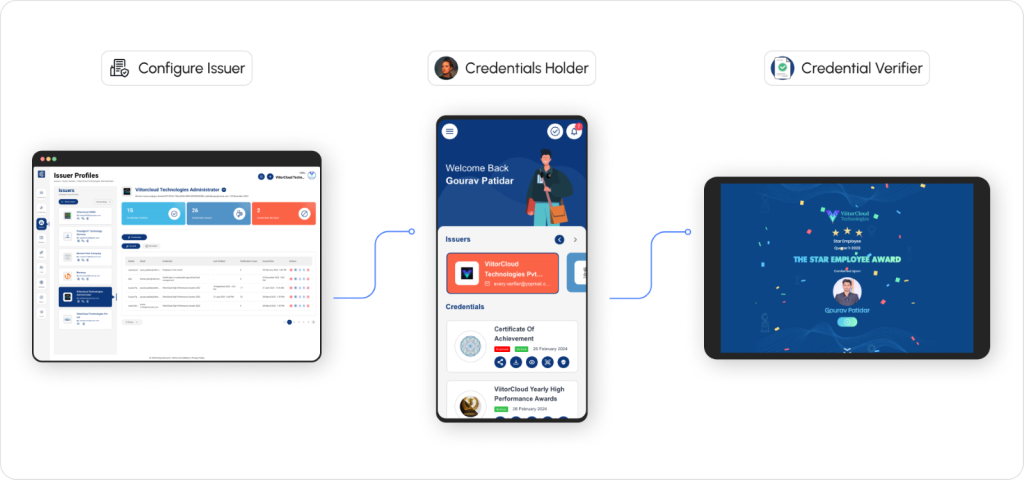In recent years, the acceptance of digital documents has increased. Let’s say we are driving in a different city without a physical copy of the driver’s license; the officer would accept a digital photocopy of that license.
However, such digital credentials can also be forged with photoshops and AI tools. Modern problems require modern solutions, and that is verifiable credentials. Verifiable credentials are the digital identities that can be verified by any person for their authenticity.
Estonia is one of the first countries to offer digital ID as a verifiable credential to their citizens so that they can access government services. Many organizations have already adopted this solution and EveryCRED can help you embrace this next-gen technology.
Moreover, it is important to understand what verifiable credentials are and why you must know about them so that you can be ready for the future.
What Are Verifiable Credentials?
Verifiable credentials (VCs) are digital copies of the information found in physical credentials, such as educational degrees, national ID cards, passports, or licenses. However, these verifiable credentials offer more benefits than physical copies when we talk about privacy, security, and ease of verification.
In a simple way to understand, verifiable credentials are:
- Digital: Existing in a standardized, machine-readable format
- Secure: Cryptographically signed (no tampering)
- Verifiable: Can be verified instantly for authenticity
- Portable: Easily shared across digital platforms
- User-controlled: Managed by the credential holder
For example, Mr. Stavan has received a professional certificate from his organization as a verifiable credential. Now, this certificate can be verified on the issuer’s public verifier by anyone he chooses to share it with. This guarantees that the presented verifiable credential is authentic. That’s the power of verifiable credentials and a decentralized identity system.
Know More About Verifiable Credentials: Verifiable Credentials: What Are They, How They Work, Their Importance, and Applications
Verifiable Credentials Ecosystem
The verifiable credentials system is based on a triangle of trust among the following key players:
- Issuers: Entities that create and sign the credentials (governments, universities, employers)
- Holders: Individuals or organizations that receive and store the credentials
- Verifiers: Parties that request and verify the credentials

This creates a very, very decentralized model of control remaining directly in the hands of credential holders who choose what is shared and with whom. For businesses, this has translated into more efficient processes and reduced liability in handling sensitive data.
How Verifiable Credentials Work
Issuance
It all starts when an issuer (this could be any government or educational institution) creates a digital credential. The credential includes information related to the holder and it would then be signed by the issuer’s private key. Then, the holder stores this credential in their wallet.
Presentation
Now, whenever an identity or credential has to be proved, the holder presents the verifiable credential to a verifier. By use of cryptographic techniques, the verifier (could be an employer, organization, or government) checks the legitimization of the credential by checking digital signatures and other cryptographic proofs.
Revocation
If a credential is compromised or no longer valid, it can be revoked by the issuer. This ensures that the credential cannot be misused by someone else.
Check: 14 Real-World Verifiable Credentials Use Cases & Applications
Verifiable Credentials Are Useful for Businesses (If Not Today, In the Future for Sure)
Until 2020, there wasn’t much chatter about AI. No one knew it would become a necessity for most businesses if they wanted to thrive. The same can be said for verifiable credentials. The incorporation of verifiable credentials offers plenty of benefits for businesses across various industries:
1. More Security and Fraud Prevention
With traditional paper or digital documents, fraud is going to be a serious and constant concern. Verifiable credentials use cryptographic proofs to ensure authenticity, making them significantly more secure.
2. Straightforward Onboarding
Verifiable credentials can speed up employee onboarding, customer verification, and regulatory compliance processes. Instead of manually checking their documents, businesses can instantly verify necessary credentials, potentially reducing onboarding times.
3. Enriched User Experience
Business enterprises can make transactions much smoother and more user-friendly for their customers and partners by offering them the opportunity to share verified information quickly and securely. This might eventually yield positive results in the form of high customer satisfaction and loyalty.
4. Cost Reduction
The automation and efficiency gained through verifiable credentials can significantly reduce operational costs. McKinsey estimates that digital ID systems, which include verifiable credentials, could unlock economic value equivalent to 3-13% of GDP in 2030, depending on the country.
5. Data Privacy and Compliance
Verifiable credentials are aligned with personal data protection regulations, such as the GDPR, as they give additional control over an individual’s identity and personal data. It will help companies reduce compliance risks and increase stakeholders’ trust.
6. Interoperability
Verifiable credentials are based on the open standards of W3C. This guarantees usage across different platforms and applications, enabling flexibility and innovation. An application that makes this concrete is real-world verifiable credentials in action: COVID-19 Credentials Initiative (CCI). CCI is the global drive to deploy verifiable credentials for both COVID-19 test results and vaccination records.
Also Check: 5 Reasons Every Industry Needs Decentralized Credential Issuer for Accreditation
Different Industries Can Benefit from Verifiable Credentials (It Can Be Yours)
As we said earlier in this article, the application of verifiable credentials is very broad across various industries. Below are examples that will help you understand the use cases of verifiable credentials in various industries.
Financial Institutions
Financial institutions like banks can use verifiable credentials to speed up the KYC process. For instance, a customer can present a government-issued verifiable credential to open an account, and the bank can verify its authenticity instantly, eventually reducing the Know You Customer process.
Hospitals and Healthcare Providers
Verifiable credentials can be used in the healthcare industry to securely store and share patient reports/records. This way, the confidential information of patients remains secure and only patients can decide to share the information with anyone and for how long.
Supply Chain Management
Verifiable credentials can be used to track and verify the origin and journey of products. For instance, an organic food retailer can issue verifiable credentials for their products so that buyers can confirm the sources of every ingredient used in a particular food item.
Education and Employment
Universities are beginning to issue digital diplomas as verifiable credentials, making it easier for graduates to share their qualifications with potential employers. Companies can quickly verify these credentials, streamlining the hiring process.
We already gave an example in the explanation of verifiable credentials that education can benefit from verifiable credentials. It makes it easier for graduates to share their qualifications with potential employers. Businesses can quickly verify these certificates and speed up the hiring process.
Read: 21 Decentralized Identity Examples and Use Cases Transforming Industries
Final Thoughts
Verifiable credentials present a way that completely changes how we prove and share our digital identity. They can enable secure, privacy-preserving, and efficient verification of someone’s personal information, potentially smoothing a number of business processes and increasing trust in every kind of digital interaction. Businesses that start preparing now will be well-positioned to reap benefits from this exciting new technology.
EveryCRED is the best platform if you want to incorporate verifiable credentials into your business. Whether you are in the manufacturing industry, finance, healthcare, education, supply chain, or any other, we can help you implement verifiable credentials and digital identities in your business.

 6th August, 2024
6th August, 2024 



